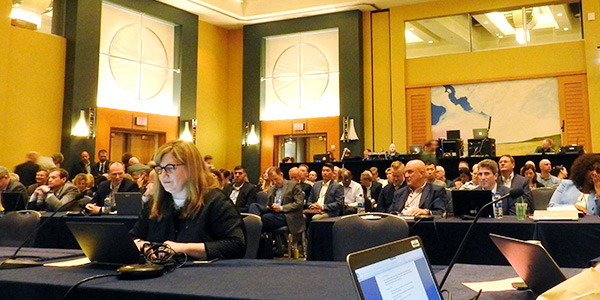CAMBRIDGE, Md. — PJM stakeholders gathered for a special Members Committee meeting on Tuesday at the Hyatt Regency Chesapeake Bay Golf, Resort & Marina as part of the RTO’s Annual Meeting.
After ‘Challenging’ 2018, PJM Looks Ahead
After a “challenging” and “humbling” 2018, PJM CEO Andy Ott said the RTO will better lead stakeholders in 2019 as it works to adapt the grid to emerging state policies and renewable technology.
“It’s not enough anymore to just have reliability at the least cost and have open, competitive markets,” he said during his keynote address Tuesday. “We need to listen to that as an entity. But it’s not just PJM alone. It’s all of us. We’re all in it together.”
While he admitted the ongoing fallout from the GreenHat Energy default looms large, Ott said PJM is working hard to implement staffing and procedural changes that were recommended as part of an independent probe into the situation. (See Report: ‘Naive’ PJM Underestimated GreenHat Risks.)
He also said PJM will keep an “open mind” as it works to incorporate energy storage and possible carbon pricing into its markets in the coming years and requested clear direction from stakeholders and federal regulators on those issues.
Nothing ‘Magical’ About RPM
Stu Bresler, PJM’s senior vice president of markets and operations, said stakeholders might want to reconsider what market mechanism best accommodates growing generation subsidies as states continue enacting policies to reduce carbon emissions.
“Markets have worked, but we recognize there’s nothing magical about the Reliability Pricing Model,” he said. “It’s one option as far as resource adequacy is concerned. At some point, maybe we ought to talk about whether there are other alternatives we should look at that could better incorporate the policy goals out there that aren’t necessarily RPM as we know it today.”
The comments came during PJM’s “Year in Review Panel,” in which leaders from each department discussed the challenges and successes experienced throughout 2018.
“Well, there’s no shortage of challenges,” said Joe Bowring, PJM’s Independent Market Monitor, citing continued regulatory uncertainty that is beginning to affect investments in the grid. “The challenges are simple to say, very difficult to do. How do we maintain competitive markets?”
But it wasn’t all doom and gloom from the Monitor, who also praised the implementation of hourly offers and five-minute settlements for setting better price signals, especially with gas-fired generation.
Steve Herling, PJM vice president of planning, noted that increasing stakeholder transparency remains a top priority for staff. “It’s critical that stakeholders understand the assumptions, the analyses and the decision-making process,” he said. “We’ve done a lot over the past couple of years to enhance transparency, but we understand there is a lot more that needs to be done.”
Likewise, PJM’s Vice President of Operations Mike Bryson said that addressing fuel security issues should continue to be top-of-mind for stakeholders. “Each year we get surprised by a different aspect of the evolving fuel mix,” he said.
FTR Forfeiture Calculation Change Endorsed
Members endorsed calculation changes for financial transmission rights forfeiture to be incorporated in the Operating Agreement.
PJM and the Monitor agreed the current forfeiture rules should be adjusted because they do not distinguish between on- and off-peak FTRs. (See “First Read on Change to FTR Forfeiture Calculation,” PJM MIC Briefs: March 6, 2019.)
FTR forfeitures are intended to discourage traders from cross-market manipulation. Holders subject to forfeiture are credited for the hourly cost of the FTR. Under current rules, a $1,500 off-peak FTR for June 2018 would be credited an hourly cost of $2.08, equivalent to $1,500 divided by 720 hours (30 days x 24 hours). Under the endorsed change, the FTR cost would be divided by only 384 off-peak hours, increasing the credit to $3.91.
Incumbent Board Members Re-elected
Three incumbent members of the Board of Managers won re-election bids: Terry Blackwell, O.H. Dean Oskvig and Mark Takahashi will each serve another three-year term.
– Christen Smith





